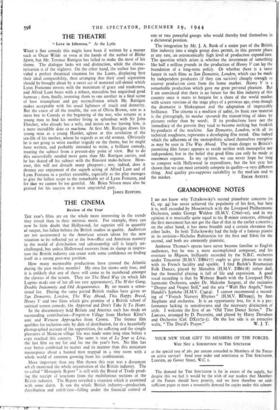THE CINEMA
Review of the Year
T.HE year's films are on the whole more interesting in the trends they reveal than in their intrinsic merit. For example, there can now be little doubt that Hollywood, far superior still in quantity of output, has fallen behind the British studios in quality. Audiences are too accustomed to the American screen idiom for the new situation to be reflected yet at the box-office and American mastery in the world of distribution and salesmanship still is largely un- challenged, but unless Hollywood recovers from its slump in inspira- tion the British industry can count with some confidence on finding itself in a strong post-war position.
How many memorable productions have crossed the Atlantic during the past twelve months? My own list shows only four, and it is unlikely that any of these will come to be numbered amongst the classics of the screen. They are The Hard Way (in which Ida Lupino made one of her all too rare appearances), The Iftler Gang, Double Indemnity and Old Acquaintance. By no means a sensa- tional list. During the same period British studios have given us San Demetrio, London, The Way Ahead, This Happy Breed, Henry V and two films which give promise of a British school of satirical screen comedy, On Approval and Don't Take It To Heart.
In the documentary field Britain and America each has made an outstanding contribution—Forgottm Village from Herbert Kline's unit and Western Approqches from Crown. The former film qualifies for inclusion only by date of distribution, for th s beautifully photographed account of the superstition, the suffering and the simple pleasures of Mexican village life was made some long time before a copy reached this country. The same is true of Le Pour se Live, the last film on my list and for me the year's best. No film has ever better combined its matter and its manner than this miniature masterpiece about a hunted man trapped in a. tiny room with a whole world of emotion growing from his confinement.
More important than any film shown this year was a document wlfch examined the whole organisation of the British industry. The so-called "Monopoly Report" is still with the Board of Trade pend- ing the receipt of reactions from the multifarious sections of the British industry. The Report revealed a situation which it examined with some alarm. It saw the whole British industry—production, distribution and exhib'tion—falling under the financial control of THE THEATRE one or two powerful groups who would thereby find themselves in a dictatorial position.
The integration by Mr. J. A. Rank of a major part of the British. film industry into a single group does permit, in this present phase at any rate, an astronomically high level of production expenditure. The question which arises is whether the investment of something like half a million pounds in the production of Henry V can lay the foundation of a long-term policy. Or whether there is a surer future in such films as San Demetrio, London, which can be made by independent producers (if they can survive) cheaply enough to recover product:on costs from the home market. Henry V is a remarkable production which gave me great personal pleasure. But I am convinced that there is no future for the film industry of this country once it starts to bargain for a share of the world market with screen versions of the stage plays of a previous age, even though the dramatist is Shakespeare and the adaptation of impeccable brilliance. The cinema is a medium of today, its basic raw material is the photograph, its modus operandi the transmitting of ideas by pictures rather than by words. If its productions have not the immediacy of the present they tend to become nothing but freakish by-products of the machine. San Demetrio, London, with all its technical roughness, represents a developing film trend. One indeed which the adherents of the monopolistic school themselves recognise as may be seen in The Way Ahead. The main danger to Britaln's promising film future appears to reside neither with monopolist nor independent, but in the belief that good films can only be made at enormous expense. In my op.nion, we can never hope for long to compete with Hollywood in expenditure, but the last year has shown that we can most certainly compete in quality—a very different thing.. And quality pre-supposes suitability to the med:um and to


























 Previous page
Previous page